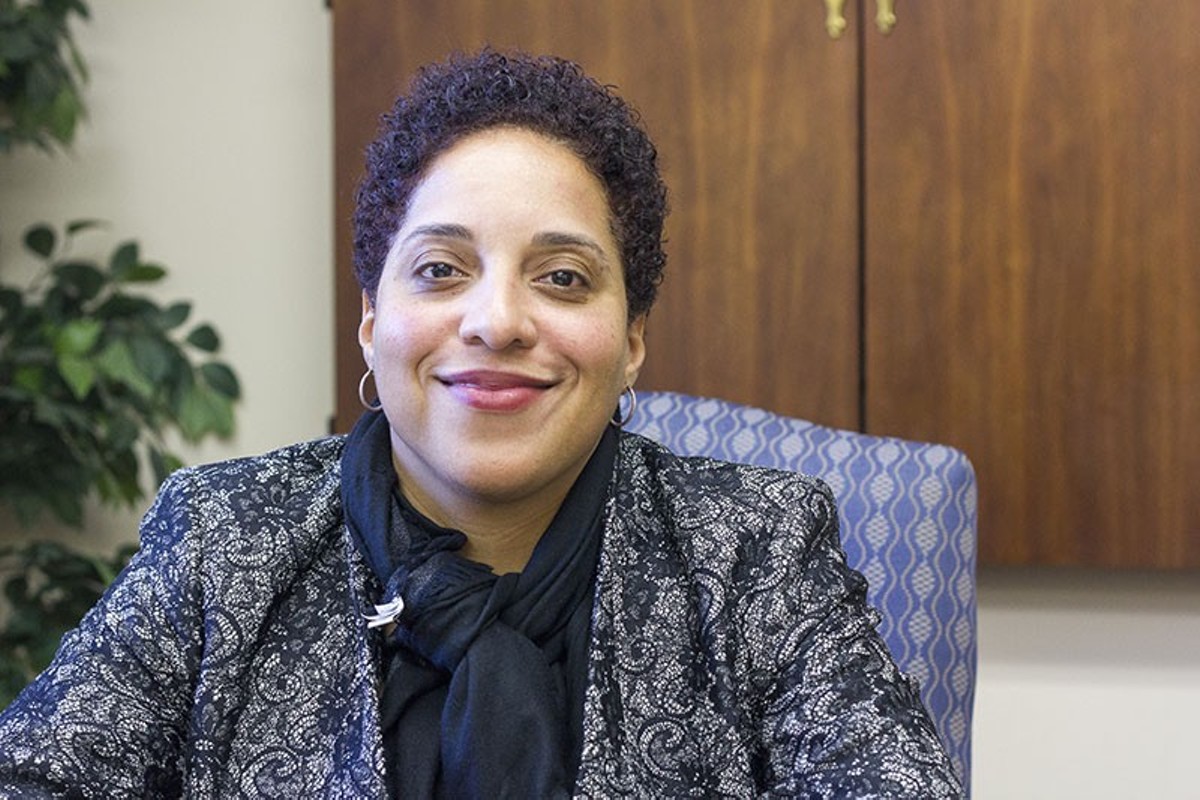On a Friday morning in June, seven months before being sworn in as St. Louis' first black circuit attorney, Kim Gardner sat in a campaign office on Delmar Boulevard and talked about a funeral.
"He was 27 years old, an up-and-coming artist. He was shot and killed in my district," she said.
Funerals are a part of Gardner's life. Her family has owned and operated a funeral home in north St. Louis for decades, and Gardner worked there as a director before taking a job in the circuit attorney's office. She left the office in 2010, after five years as a prosecutor. She returned to public service only two years later, landing in the state capitol as a representative for the 77nd district, an area that includes several of St. Louis' most violence-stricken north-city neighborhoods.
"That's really the reason that I'm running for circuit attorney," Gardner continued. "I see the destruction of violent crime every day. We come together for more funerals more than we do to celebrate graduations. We have to do better. And the community wants to do better. That's why we have to give the community hope, and that's what I plan to do."
For Gardner, that isn't quote-unquote getting tough on crime, as politicians have promised to do in St. Louis for decades. As she explained during one debate, she's lived "a black life." She knows first-hand that black lives are not just disproportionally shortened by violence, but too often lost to prison.
"When we talk about criminal justice issues, most of the prison population looks like me," Gardner told the debate crowd. "So black lives matters, but you all matter, your civil liberties matter. Your life matters. And we need to do a better job as prosecutors going forward to address those issues."
Gardner didn't just win her race. She blew her opponents out of the water, taking 47 percent of the vote in the crowded Democratic primary. She had no challenger in the November general election.
Gardner's ascension to the top prosecutor job in the city conferred a message: St. Louis is ready for change. As circuit attorney, Gardner is one of the two most powerful elected officials in St. Louis, along with the mayor. She directs 60 prosecutors who handle thousands of criminal cases each year, from the lowest misdemeanors to the most complex homicides. Crime victims rely on her office for justice. But as Gardner sees it, so too do defendants.
That's a perspective shared by many black attorneys who've toiled within the city's criminal justice system, whether they've worked as prosecutors or sat on the other side of the table as defense attorneys.
With Gardner now in office, these lawyers say they see a unique opportunity to change policies in the Circuit Attorney's Office that they found troubling — and to ensure that the people prosecuting cases look like the community they represent.
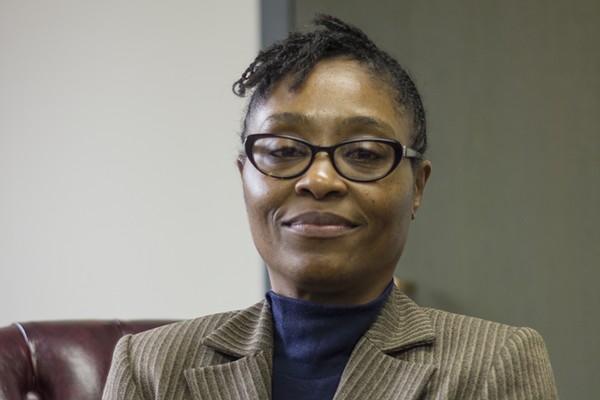
Justice, and only justice, you shall pursue... — Deut. 16:30
The Bible verse is stamped in gleaming letters on a plaque outside the fourth-floor Circuit Attorney's Office, which is located inside the towering gray fortress of the Circuit Court building in downtown St. Louis. To the right of the plaque, inside seven black frames hanging on wall tiles that look like cut marble, are the names of those who've worked as line prosecutors within the office. The dates on the list go back to the 1970s.
Some of the names on the list founded law firms or became renowned judges. Gardner's name is there too, in tidy white lettering on the bottom of the fifth panel from the left, marked 2005-2010.
Annette Llewellyn's name isn't on the list yet, but that's because her prosecutorial career has only just started.
Llewellyn spent much of the last seventeen years as a public defender in St. Louis, representing suspected criminals in cases that directly pitted her against the circuit attorney's prosecutors. In January, however, the Bronx-born lawyer joined Gardner's circle of top administrative staff. Llewellyn now oversees the office's stable of felony trial attorneys.
She brings with her a long memory of frustration with the office.
"What I had seen from this office was a sense of 'us against them,'" Llewellyn says in an interview in her new office in February. "That was just the culture that seemed to develop over those sixteen years or so when Jennifer Joyce was circuit attorney. It was prosecutors versus defense."
Prosecutors and defense attorneys are supposed to act as adversaries, as Llewellyn concedes. But what she perceived over the years went beyond the norms of arguing over evidence or cross-examining witnesses.
The problem was with negotiation. Simply put, Joyce didn't do it. Defendants and their lawyers were kept in the dark about the possible sentences and pressured to plead guilty as a matter of course. Prosecutors were instructed to play hardball, demanding defendants take a guilty plea without preconditions or an agreement beforehand. Defendants were routinely prevented from knowing the state's initial recommendations for sentencing.
That firm stance gave the prosecutor's office incredible power — but Llewellyn says it didn't always serve the facts of the case.
"There was never room to work the case out before you got to trial," explains Llewellyn. "In terms of resolving cases, recommendations are basically how you start the negotiating process. But Jennifer Joyce decided to stop making recommendations, and so things would take longer, because the defendant was not going to do anything until forced. So you'd have to go to court."
Under Gardner, Llewellyn says the office has re-opened the door to negotiations with defense attorneys.
"We can move cases a lot more efficiently that way," she says. Plea agreements are back on the table, and sentence recommendations are no longer concealed as a top-secret bargaining tool.
It may seem like a small change, but it represents a fundamental shift from Joyce's long-established style of management.
Some criminal defense attorneys say they'd like to see Gardner go even further. For instance, Clayton-based lawyer Brandi Miller suggests that the office reconsider how it processes bond-reduction requests.
"Three days makes a difference between having a job and not having a job," vents Miller. "I would have guys that are locked up on ridiculous bonds, and they've lost jobs, apartments, everything — just to get probation at the end. It doesn't make any sense."
In fact, Miller recalls facing Gardner in court about ten years ago, when Gardner was still an assistant circuit attorney under Joyce. The case, says Miller, ended with her client landing on probation. He still lost his job because the Circuit Attorney's Office successfully fought Miller's request to lower his $30,000 bond.
"I had several cases with Kim, and it would be kind of funny," says Miller, "because she and I would talk about a case and try to resolve it, but she didn't have the authority. So she'd have to go to her bosses. Typically whatever we came up with would be turned down."
It was that lack of autonomy — the need to run even small decisions about a case up to the office's executive staff or Joyce herself — that foreshadowed Gardner's departure in 2010, she confirms.
Llewellyn believes that Gardner wasn't the only line prosecutor stymied by their limited influence on the course of a case. The lack of freedom may have chafed especially hard for black prosecutors, Llewellyn believes, many of whom were stuck handling lower-level cases, where there was even less flexibility.
"It was something that was same for the black attorneys back then, they weren't getting moved up into the more victim-intensive units," she says. "I don't think [Gardner] got that chance. And I knew other attorneys in this office who did not get that chance."
It wasn't just a case of title envy: Being promoted to higher-level units meant handling serious crimes, such as homicide and rape, and along with the added complexity, those cases conferred responsibility and indicated a level of trust. Over the years, Llewellyn claims, Joyce's trust seemed particularly limited when it came to black prosecutors.
"I only remember two team leaders who were actually black or any other minority class," Llewellyn says. "And obviously none of the executive staff I've ever seen since I've been working in this city have been of any minority class at all."
The Circuit Attorney's Office has historically struggled to retain black prosecutors, and only in rare stretches over the last three decades has the office boasted more than ten black attorneys on a staff that usually hovers around 60.
In Joyce's defense, competition for top black lawyers is fierce, and the circuit attorney's office cannot come close to matching private-sector salaries. Under Joyce, the office achieved far greater diversity than the average law firm in St. Louis — a city, it should be noted, that counts about 50 percent of its population as black. According to an annual study by the National Association for Law Placement, only five percent of attorneys employed by St. Louis firms are black. Nationally, that number barely breaks four percent. Even with Gardner's recent hires, the current office boasts just ten black prosecutors.
But some black lawyers, including Llewellyn, say they were interested in the prosecutor's office in past years — only to find the office wasn't interested in them. In 1997, soon after she moved to St. Louis, Llewellyn says she mailed an application to the Circuit Attorney's Office, which at the time was being run by Dee Joyce Hayes. She says she never heard back. Llewellyn joined the public defender's office instead, where she was able to observe the Circuit Attorney's Office change hands with Jennifer Joyce's election in 2000. All the while, Llewellyn noticed a steady cycle of black prosecutors in and out of the office.
Now that she's inside the office, Llewellyn says she's been "pleasantly surprised" by the willingness of the prosecutors who worked under Joyce to sign on for Gardner's new prosecutorial philosophy.
"Not all the attorneys have this mentality of us-against-them," she says. "Honestly, I haven't had to change a lot of minds since I've been in here."
And that's remarkable in light of the fact that Llewellyn sees her job as nothing less than a total shift in thinking. She notes that before Gardner's election, defense attorneys and prosecutors were always separated — even during the weekly docket calls where new cases are picked over by prosecutors and public defenders. Under Joyce, the two sides sat at different tables, positioning themselves as rivals as they weighed new cases. Now, prosecutor, defense attorney and judge sit at the same table in the docket office.
It's symbolic — but for the longtime public defender-turned-prosecutor, it's a good start.
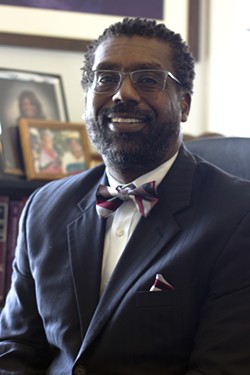
In 1994, Circuit Attorney Dee Joyce Hayes added two greenhorn prosecutors to her office: Jerryl Christmas and Jennifer Joyce.
Six years later, when Hayes announced her decision not to run for a third term, it was Joyce and Christmas who fought for the vacant throne in the Democratic primary. Christmas mounted campaigns against Joyce in 2000 and 2004, but both attempts ended the same way — with Joyce cleaning his clock.
Sixteen years later, when Joyce announced her own retirement, Christmas' phone started to blow up.
"Everyone just assumed that I was going to run," he recalls. But he says he just hasn't felt the same fire for the campaign trail since his previous attempts. He left the Circuit Attorney's Office in 2001, and over the next sixteen years he transitioned from prosecutor to defense attorney, hounding Joyce and the city's police department in high-profile civil litigation and criminal defense work.
For Christmas, seeing Gardner succeed where he failed was inspiring, even though he'd once hoped to claim the mantle of circuit attorney for himself.
"Her winning the office was not only historic, it was monumental in the struggle to diversify that office," he says. "When Kim was elected, it was like a weight had been lifted off the shoulders of the whole community. There's already been a ripple effect."
Christmas believes that hiring Llewellyn and a second longtime public defender to top positions in the office were "brilliant" moves that made Gardner the talk of the black legal community. He also suggests that the visibility of a diverse staff could help attract more minorities to the office and reduce the stigma around black attorneys becoming prosecutors.
Joyce, it should be noted, has accused Christmas of fueling that very stigma. In a 2016 interview with Riverfront Times, Joyce acknowledged that she'd struggled to keep black prosecutors in the office, but she maintained that diverse hires are routinely driven away by "a ton of abuse" from the public. During the interview, Joyce singled out Christmas as a source of abuse: In November 2015, he tweeted that a ten-year-veteran prosecutor, Cynthia Copeland, was nothing more than Joyce's "black puppet."
Christmas now insists that he never intended to demean Copeland, who currently leads the Officer-Involved Shootings Unit. The "black puppet" tweet, he says, was his attempt to argue that Joyce had exploited Copeland's blackness under the guise of empowering diversity.
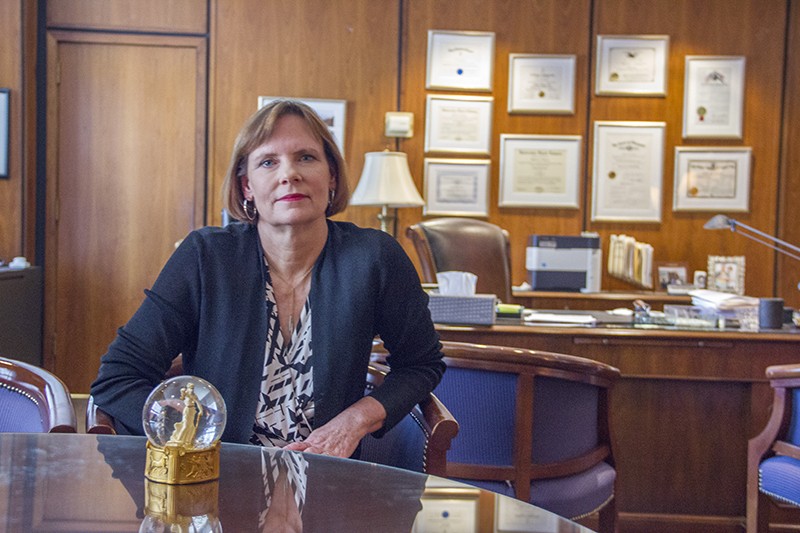
"We had these black families whose children had been killed by the police, and whenever Joyce would meet with the family to talk about the case, she would bring Cynthia Copeland," Christmas says. He had no problem with Copeland's work, he says, but he believed Joyce was using Copeland's blackness as a buffer whenever sensitive cases arose involving cops and grieving black families. (Copeland declined comment.)
Christmas wasn't making his critique as a bystander. He represented the families of Vonderitt Myers and Mansur Ball-Bey, two teenagers who were shot and killed by police officers. In both cases, Joyce declined to prosecute the officers involved.
That's the tricky part of diversifying an office that also wields the direct power of the criminal justice system. Gardner is changing that system, but there may come a day, probably soon, when she and Christmas clash, finding themselves on opposite sides of a case. How will she react when Christmas starts tweeting about her? Or if protesters show up at her office?
"I know that at some point there's going to be a crisis, that's just inevitable," Christmas says. "It's the prosecutor's office. It's not going to be a honeymoon forever."

There's a separate challenge Gardner will soon face at the Circuit Attorney's Office: burnout. Serving as a prosecutor is incredibly tough; you accept low wages and a tough workload because you want to make a difference. Instead, many prosecutors find themselves sending an endless line of young men to jail.
Yinka Faleti lasted just under three years as city prosecutor. A childhood immigrant from Nigeria, Faleti graduated from the United States Military Academy at West Point and did two deployments in Kuwait as an Army officer. He moved to St. Louis in 2004 to complete a law degree at Washington University and, upon getting his degree, took a job in the St. Louis office of Bryan Cave, a law firm that boasts of paying even first-year associates salaries that easily top six figures.
Still, Faleti wanted to do good. "It was a great firm," he says of Bryan Cave. "But I realized more and more that what was in my heart was really the service that I had practiced in the Army. I wanted to get back to service."
He jumped to Joyce's office in 2011. At the time, he says, the Circuit Attorney's Office employed three black attorneys. His hire made him the fourth.
The job began to wear on him. Those judges who disagreed with Joyce's policies would often take out their frustrations on mid-level assistants like him, berating them in open court. But being yelled at by a judge wasn't the worst part of the job. For Faleti, it was the felony arraignment docket that became too much to bear.
"Every morning, Monday through Friday, that docket is full of primarily African American men in orange jumpsuits chained to one another," he says. "It is saddening. It is absolutely saddening."
Faleti never planned on becoming a career prosecutor. And so in 2013, he exchanged his prosecutor's credentials for a white-collar position with the United Way as senior vice president for philanthropic, donor and community services.
At the Circuit Attorney's Office, "I began to feel more and more that I was too late in the whole process," he says. "A prosecutor cannot undo what's been done; you're coming in after the crime has already occurred. The victim is already victimized. I wanted to get from the back-end of this process to the front. I looked to the front and I saw United Way, where we can help kids take a different course."
Faleti's story isn't unique among young black attorneys who pass through the Circuit Attorney's Office. The disheartening reality of the job, combined with low pay and high stress, contribute to high turnover and a chronic shortage of experienced black trial prosecutors.
"Prosecutors can give the victim a sense of justice, but they're ultimately too late. Even police officers are, in most cases, too late for the victim," Faleti says.
This sense of burnout isn't limited to active attorneys. Aigner Carr, who is finishing up her last year at Saint Louis University School of Law, spent a semester last fall clerking with the Circuit Attorney's Office.
"It was morally challenging," she says. Based on her classroom studies, she had expected prosecutors to take a person's background into account in how cases were handled. But when it came to seeing the process in action, those classroom ideals were replaced by the steady, heavy-handed machinery of justice.
After one trial, she cornered a prosecutor and tried to grill him about a certain defendant. What high school did he go to? How did he grow up? What are his parents like? What was his educational background?
"I didn't feel like at any point like those things were taken into account," she says. "The prosecutor was literally like, 'I don't know.'"
For soon-to-be-graduating black law students, Gardner's election has put the Circuit Attorney's Office in a new light. Alexus Williams, a second-year law student at SLU, clerked alongside city prosecutors last summer and witnessed the way some black peers discounted her choice. With a black woman now in charge, she says, that perception has changed.
"It's a very interesting position to be in as a law school student," Williams says. "Because as soon as I say, 'I want to be prosecutor,' then I'm automatically a sellout. The general stigma of people of color in prosecutorial positions is not good. What people don't understand is that there is so much power in being on that side of the system."
The stigma wasn't unique to the office under Joyce, by any means. In the early 1990s, Marvin Teer was a young lawyer clerking under a federal judge when he got an offer from the Circuit Attorney's Office. It was a position he had little interest in, at least at first.
"I didn't like the cops too much back then," he says. "As a kid, one time in particular I got stopped by police and I literally got a shotgun put to my head. So I figured that I'm going to become a public defender and I'm going to fight for truth and justice."
Teer grew up middle class in north St. Louis, the only son of a teacher; he's now a dapper administrative law judge presiding over workers' compensation cases for the state. His office walls are papered with awards and news clippings from a long legal career, including six years as a prosecutor under Dee Joyce Hayes and several more as a prosecutor with the Missouri Attorney General's Office.
Clearly, plans changed.
"I talked to my dad," Teer continues, as a jazz trumpet solo drifts from a stereo in his office. "He said, 'Son, if you going to be part of making change, you have to be part of the change.'"
Teer understood his father's point: The Circuit Attorney's Office is supposed to be an instrument of justice for all people, and that power requires an investment by all people seeking justice — even those who have been abused and locked out of the system. This realization persuaded Teer that the moral heartache was justified. "Ninety percent of the people they were locking up were black people," he notes. "That's my neighborhood and that's my community. That's my responsibility."
Law students like Williams and Carr are faced with a similar choice, and Teer believes young black attorneys should feel that shared responsibility for their communities. While it might be crushingly difficult to watch a stream of shackled black bodies passing through the warrant office, Teer recommends considering the perspective of the shackled defendants as well.
"At least they're seeing someone that looks like them," says Teer. "It helps the community believe that they will have not only some sense of justice, but maybe, in the end, they will have some degree of peace, too."
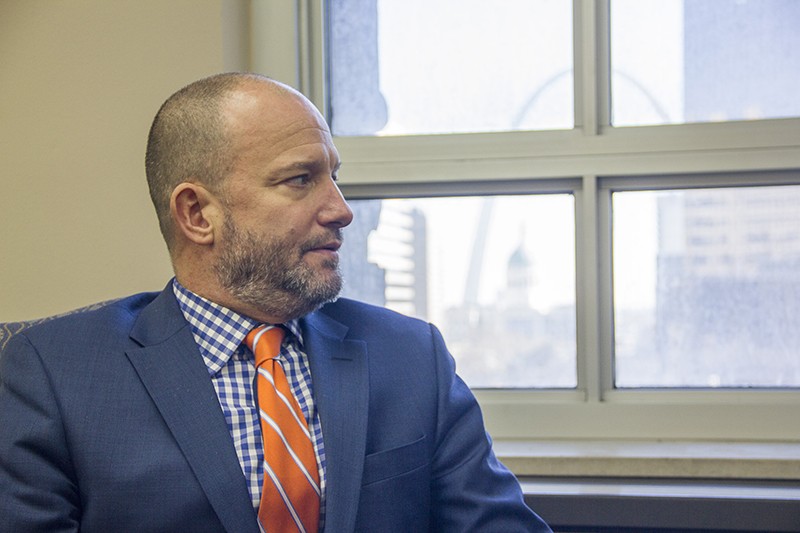
Past the Bible verse hanging outside the door and down a seemingly endless hallway, St. Louis' new circuit attorney and two members of her newly hired executive staff, Robert Steele and Chris Hinckley, sit across the reflective surface of a polished conference table. They talk about diversity and change.
Gardner explains that her new hires bring assets that are less about skin tone and more about life experience.
"It's about diverse thought," says Gardner. "Many people have asked me, 'Is it just bringing African Americans into the office?' I'm like, 'No, it's about diversity of thought, of mindsets, and that's not always just about race.'"
Hinckley is part of that. He's white, and has returned to the Circuit Attorney's Office after a long hiatus; he departed the office in 2006 after seven years working as a prosecutor under Joyce to become lead counsel for the Missouri Gaming Commission. Now, he's back as Gardner's chief warrant officer.
Steele, like Llewellyn, is a former public defender and a first-time prosecutor. Before taking the job under Gardner, Steele's career in criminal defense stretched back 24 years, the last ten of which were spent as a lead defense attorney on death penalty cases.
More changes in the staff are on the horizon, but Gardner says that it was important to get her executive staff established from the get-go. The office is still in transition, and it's no easy task to change a place where things have been done a certain way for sixteen years.
Some policies, though, have been changed quickly, including the office's new flexibility on plea bargaining.
"I think it's our duty to give recommendations, to let the other side know that this is the charge," says Gardner, sounding very much like those defense attorneys who chafed under Joyce's policy of secrecy. "If a case can be disposed of without going to trial, we can start the process."
Steele sees good things coming from open lines of communication with defense attorneys and their clients. "When you start to get into the recommendations and negotiations, you see other factors which should be considered, and it contributes to a system where incarceration is not the only option," he says. "Does the defendant have mental health issues? What is his social history? What is his family background? All these things add to what has traditionally been, 'Well does he have a prior conviction?' — as if that is the totality of his life."
Hinckley chimes in. "That's justice," he says. "You can hammer every nail, every nail big and small, and the crime rate is still what it is. Kim could say, 'I hammer every nail' and she'd be safe, because people want a prosecutor to be the hammer. But how can you keep hammering those nails if that end is not changing?"
A long list of issues still faces the office, and Gardner cautions that she's still very much in the midst of transition. She's been on the job just two months, and even some policies she knows she wants to change aren't as simple as just snapping your fingers. She campaigned on expanding diversion programs and giving line prosecutors increased autonomy, for instance, but enacting those changes is a far more complicated proposition when she's still brand-new — and still must answer for every case the office handles.
Other policies require further evaluation, Gardner says. That includes Joyce's 2014 creation of a special in-house investigation unit for police shootings and a sister program to send prosecutors to homicide scenes.
"We have to look at resources and manpower," Gardner says.
The list goes on. Gardner wants to expand the office's homicide trial staff and increase starting salaries to cut down on turnover, but funding would ultimately need support from City Hall — and since she'll be joined by a new counterpart there in a few months, as well as some new members at the Board of Aldermen, everything's in limbo for now.
Gardner has other campaign promises to keep: protecting crime victims and witnesses, increasing the use of treatment courts in drug cases and reducing the barriers for ex-offenders to find work. Above all else, Gardner knows that St. Louis is looking to her and other city leaders (including the next mayor) to confront violent crime and a homicide rate that has remained at a record high two years running.
It won't be easy. Still, the larger black legal community is rooting for her, even as law students like Williams and Carr are hopeful. Someday, their names could join Llewellyn, Steele, Christmas and the others commemorated inside the black frames hanging outside the office.
Laying out her goals for the next two or three years, Gardner characteristically doesn't talk about sending murderers to prison or justice for victims — signaling, once again, the sea change underway within the Circuit Attorney's Office.
"I want to be able to say that I saved this many people from going into the criminal justice system," Gardner explains. "That they got jobs, that they're gainfully employed and productive citizens, and that we have witnesses and victims participating in the system because they trust police. That would be success right there."

